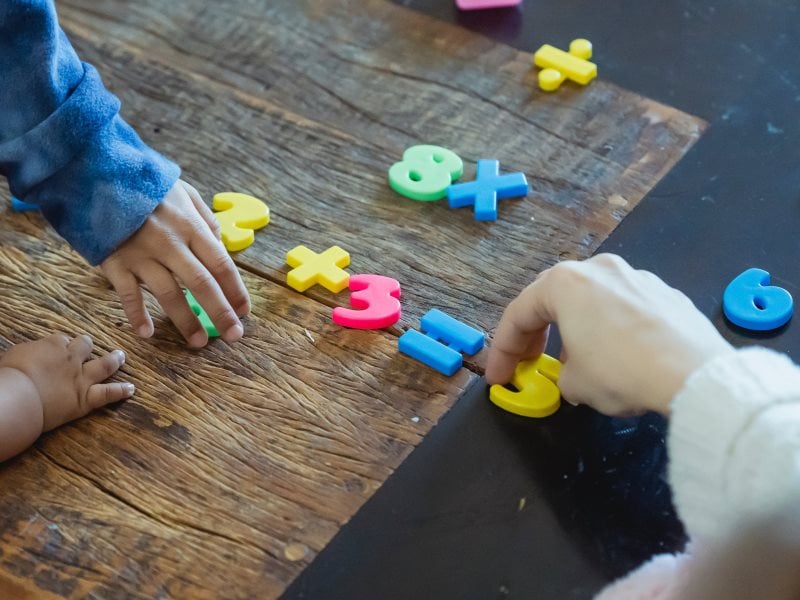 At some point, every parent will face the dreadful scenario when their child refuses to learn an important life skill. Whether it be swimming, karate, mental math, reading, or even tying their own shoe laces, at some point, every child will rebel and ask the confounding question: "Why do I need to learn ____, when" (someone else can do it, calculators exist, I don't like to do it, it's so hard... the reasons are endless).
At some point, every parent will face the dreadful scenario when their child refuses to learn an important life skill. Whether it be swimming, karate, mental math, reading, or even tying their own shoe laces, at some point, every child will rebel and ask the confounding question: "Why do I need to learn ____, when" (someone else can do it, calculators exist, I don't like to do it, it's so hard... the reasons are endless).
As a modern parent, what should you do? You enrolled your child into a (costly) swimming program. Now, just a few weeks later, your child firmly argues "I don't want to go!" How do you handle this conundrum?
- On one end, you don't want to force your child to do something they don't want to do. After all, reliable research studies have shown that coercing children to do something they don't want to do has long-lasting negative ramifications.
(Also, when you were younger, your parents pushed you to eat broccoli, and now you hate broccoli. You're a modern parent. You appreciate your parents and all they did, but also, you'd like to learn from their mistakes). - On the other end, you believe swimming is an important life skill.
Firstly, the ability to swim could save your child's life in an emergency situation. According to The CDC, from 2005-2014, " there were an average of 3,536 fatal unintentional drownings (non-boating related) annually in the United States — about ten deaths per day." Moreover, of these drowning deaths, one in five were just children, ages 14 and younger.
You don't want your child to end up as one of these terrifying statistics. You want to protect them and ensure that they can hold their own in an emergency situation -- now and in the future, as well.
Moreover, having the ability to swim could allow your child to enjoy this healthy activity throughout their life. Not knowing how to swim could deprive your child of myriad leisure and vacationing activities (boating, scuba diving, beach vacations, water skiing, snorkeling, etc.)
The bottom line is, as a parent, you truly believe learning to swim will only enhance your child's life -- both in terms of safety, as well as enjoyment. But at the same time, you don't want to force your beliefs down your child's throat. So what should you do?
 Well as acclaimed University of Pennsylvania Psychologist Dr. Angela Duckworth posits in her best-selling book, "Grit: The Power of Passion and Perseverance," it is your child's grit (ability to stick with things over the long term), not their sheer talent, that will matter in the run. Duckworth has conducted multiple longitudinal studies of children over time, and repeatedly found that grit (not IQ or academic achievement) was a clear requirement for long-term success in academic and life trajectories.
Well as acclaimed University of Pennsylvania Psychologist Dr. Angela Duckworth posits in her best-selling book, "Grit: The Power of Passion and Perseverance," it is your child's grit (ability to stick with things over the long term), not their sheer talent, that will matter in the run. Duckworth has conducted multiple longitudinal studies of children over time, and repeatedly found that grit (not IQ or academic achievement) was a clear requirement for long-term success in academic and life trajectories.
So what does grit have to do with swimming? Well, grit combines resilience, ambition, and self-control in the pursuit of goals that take many months, or even years. Grit is a skill every child can develop, but only if they are taught to persevere through hard times. Consequently, if we, as parents, give in to our child's laments and allow them to quit when the going gets tough -- well, we are denying our child the chance to learn how to push through discomfort and focus on achieving the larger goal they set out to achieve.
In short, don't let your child quit swimming so easily. Rather, when your child complains:
- Remind them that swimming is an important survival skill. Just like walking, reading, writing, or even mathematics, swimming is an essential life skill that will only safeguard and enhance your child's life.
- Have Them Set Incremental Goals:
By setting realistic and achievable goals, you and your child are laying the foundation for growth mindset. Start from where your child is. Next week can they hold their breath for 10 seconds longer, or increase the distance they swim by 2 meters?
In doing this, you are subtly nudging your child to learn that they can always use right where they are as a stepping stone for improvement, and, ultimately, excellence. - Teach them the Value of Effort:
Show them examples of successful swimmers (Michael Phelps, Yusra Mardini, etc.) and focus on the effort it took for them to get there. Don't compare your novice child to these world class athletes. Instead, emphasize that swimmers like Phelps and Mardini were not born great, and there may have even been days when they hated swimming. But every day they pushed themselves and worked hard.
Similarly, if your child just puts forth the effort ; if they push themselves to be better and work hard to a set goal, they too can achieve great things.
Remember, when we focus on effort, rather than results, we can turn even the most insurmountable height into something possible to achieve. - Don’t Quit on a Bad Day:
Finally, remind your child that, in this family, we do not quit on a bad day. Whether it be a 'survival skill' like swimming or math, or a less consequential activity like baseball, violin or billiards, giving up when a task is frustrating means your child might miss out on achieving something great – something small, that might inspire them to keep on trying and improving.
A big part of grit is pushing through discomfort and failure, and learning to try again. Moreover, most activities will be difficult at first! Why, that's the nature of life. Only if your child learns to push through the discomfort of initially performing poorly, they can realize the wonder of mastering a new skill.
Insist that your child follow through all activities until the end of the season/session. Remind them that honoring your commitments is an important value, and that their perseverance shows how strong they really are.
If, by the end of the season, they have achieved their goal (or at least honestly tried to) and they still want to quit, allow them to make that call. But, require them to find a different activity they commit to.
Implement the "Hard Thing Rule":
Fine, your child achieved their goal and still wanted to quit swimming (their heart just wasn't in it). But require them to have at least one new (and difficult) skill they are working on. Your child can choose their own thing, but it should be both interesting to them and require 'deliberate practice almost daily'.
By doing so, you are teaching your child to always push themselves out of their comfort zone and to work on learning / mastering new skills. Good! You want them to know that success is not natural -- success is hard work. Talented people only succeed when they toil to hone their abilities, through hours of deliberate practice.
Whether it's swimming or bocce ball, use extra curricular activities as a medium to build your child's grit. Teach them to honor their commitments and goals, especially when the going gets tough. By doing so, you are preparing your child to handle life. By modeling grit (especially when your child wants to quit swimming), not only are you equipping your child with an essential life skill, but you are also teaching them how to push through the zeniths and nadirs of life and learning, and to work until they successfully complete a larger goal.
Who knew a simple swimming lesson could teach so much?
Sources
Centers for Disease Control and Prevention, National Center for Injury Prevention and Control (2016). Unintentional Drowning: Get the Facts. [Web]. Retrieved from https://www.cdc.gov/homeandrecreationalsafety/water-safety/waterinjuries-factsheet.html
Denby, D. (2016). The Limits of "Grit". [Web]. Retrieved from https://www.newyorker.com/culture/culture-desk/the-limits-of-grit
Fessler, L. (2018). “You’re no genius”: Her father’s shutdowns made Angela Duckworth a world expert on grit. [Web]. Retrieved from https://qz.com/work/1233940/angela-duckworth-explains-grit-is-the-key-to-success-and-self-confidence/
Jacobsen, M. (2015). 5 Ways Children Learn to Hate Vegetables. [Web]. Retrieved from https://www.huffpost.com/entry/5-ways-children-learn-to-hate-vegetables_b_6265412?guccounter=1
Saul, H. (2016). Yusra Mardini: Olympic Syrian refugee who swam for three hours in sea to push sinking boat carrying 20 to safety. [Web]. Retrieved from https://www.independent.co.uk/news/people/yusra-mardini-rio-2016-olympics-womens-swimming-the-syrian-refugee-competing-in-the-olympics-who-a7173546.html
Seidenberg, C. (2018). Parental feeding styles can have consequences for kids. Which type is yours? [Web]. Retrieved from https://www.washingtonpost.com/lifestyle/wellness/parental-feeding-styles-can-have-consequences-for-kids-which-type-is-yours/2018/03/23/eef9c136-2155-11e8-86f6-54bfff693d2b_story.html





